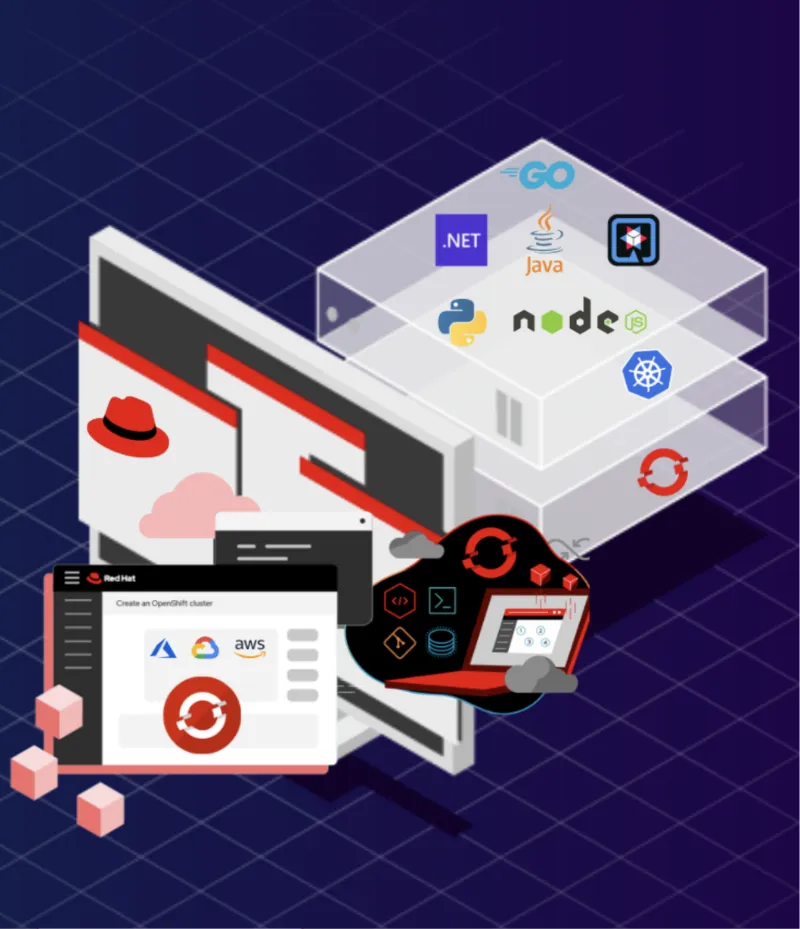To create, debug, and deploy cloud-native applications, a developer needs various toolsets to achieve them together. Developers have the power of choice now and drive the decision-making for it. As Red Hat, we must embrace this continuity and focus on delivering integrated value to our developer community.
Today, we are excited to announce a new and improved OpenShift Toolkit 1.0 extension by Red Hat, a set of extensions for Visual Studio Code and IntelliJ that aims to simplify the OpenShift & Kubernetes cloud-native developer experience. Thus providing developer tooling at the fingertips, starting at the IDE with faster development workflow around Kubernetes.
As a developer, coding on IDE, switching terminals and installing dependencies to run the code on OpenShift can be time-consuming. This leads to a delayed inner loop experience. Through this IDE extension, we aim to improve the overall inner loop experience with fast, local application development on OpenShift. With this 1.0 release of OpenShift Toolkit (previously known as OpenShift Connector), we have focused on providing multiple ways to improve the developer workflow when working with your applications and deployment on the cloud running on OpenShift or Kubernetes.
The OpenShift Toolkit extends Visual Studio Code and IntelliJ to provide all of the power and convenience of IDEs for developing cloud-native Kubernetes applications., without leaving the comfort of your IDE. For a developer to run the local code on an OpenShift instance, test & debug it and deploy it on production without worrying about the complexities around different K8s tools. This extension provides a seamless experience for developers to perform all such operations in a few clicks and quick on-boarding on OpenShift application development, thus focusing on developing the application rather than multiple tools set-up and configuration.

With OpenShift Toolkit, developers can enhance the workflow in the following ways:
- Connect and Provision the OpenShift: As a developer, we already have the code ready in our local workspace. To get started with cloud-native app development, we need an instance of OpenShift to test, build and deploy the code on. Now there is no need to leave the IDE and loom around for the cluster. The OpenShift Toolkit allows to provision OpenShift cluster locally using OpenShift Local or in the cloud using Red Hat Developer Sandbox, all these with a guided UI workflow within the IDE.
- Hybrid Cloud Support: Using this extension, developers can connect to any instance of OpenShift running such as OpenShift Local, Red Hat OpenShift on AWS, Azure Red Hat OpenShift, and Developer Sandbox for Red Hat OpenShift (30 days free-tier).
- Quick Inner-Loop Development: This extension allows the developer to develop applications either through the local workspace, git repository or default devfile templates. With a one-click solution, developers can quickly create components on the cluster and start them in development mode, syncing all changes happening live on the cluster. Thus get the applications from source to workload in minutes.
- Git to OpenShift: The extension allows a one-click strategy to deploy your git repository code directly to OpenShift with a recommended strategy of the deployment method.
- Kubernetes Resources Management: Developers can view and edit Resources YAML manifests, and view logs for pods, deployments, and deployment configs. The extension also allows users to view these resources in the cluster dashboard.
- Seamless Kube Config Context Switch: Developers can work with applications in multiple Kubernetes contexts and switch between them as required, directly from the extension view. Thus allowing them to run applications the same way in development as it does in the production environment.
- Multi-platform support: Available on MacOS (with arm64 support), Windows and Linux.
The Toolkit is available to download from Visual Studio Code Marketplace and JetBrains Marketplace. The code is open-source and please reach out to us for feature requests and Discussions on GitHub.
We are aiming to improve the cloud-native developer experience on OpenShift with OpenShift Toolkit as the recipe for it from the comfort of your favorite development tools. Get started developing for OpenShift with OpenShift Toolkit today and let us know your feedback.
About the author
Mohit Suman works as a Senior Product Manager driving innovation at Red Hat Developer Experience Team. He has experience in product management, software engineering and architecture in fields such as large-scale distributed computing and developer productivity. Currently making software to enhance the overall developer experience for Java ecosystem, Hybrid Cloud infrastructure, Red Hat Developer Hub.
With a keen eye for innovation and a relentless pursuit of excellence, Mohit Suman continues to be a driving force in the intersection of product management and cutting-edge technology, leaving an indomitable impact on the ever-evolving landscape of developer tools and hybrid-cloud solutions.
More like this
F5 BIG-IP Virtual Edition is now validated for Red Hat OpenShift Virtualization
Looking ahead to 2026: Red Hat’s view across the hybrid cloud
Heroes in a Bash Shell | Command Line Heroes
Communicating the Value of Connecting Systems | Code Comments
Browse by channel
Automation
The latest on IT automation for tech, teams, and environments
Artificial intelligence
Updates on the platforms that free customers to run AI workloads anywhere
Open hybrid cloud
Explore how we build a more flexible future with hybrid cloud
Security
The latest on how we reduce risks across environments and technologies
Edge computing
Updates on the platforms that simplify operations at the edge
Infrastructure
The latest on the world’s leading enterprise Linux platform
Applications
Inside our solutions to the toughest application challenges
Virtualization
The future of enterprise virtualization for your workloads on-premise or across clouds
